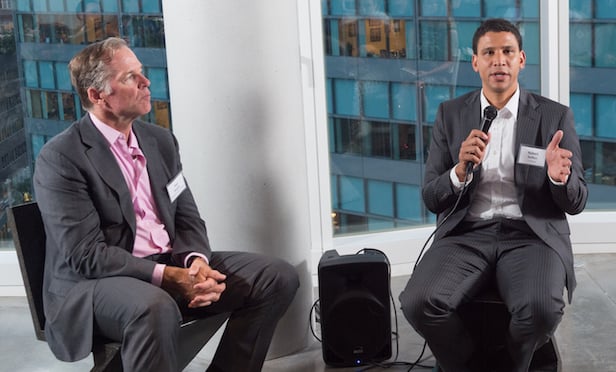 From left: Paul Massey, Robert Reffkin/ photo credit: Mark Sagliocco @marcojsagliocco
From left: Paul Massey, Robert Reffkin/ photo credit: Mark Sagliocco @marcojsagliocco
NEW YORK CITY—With news such as Eastern Consolidated's closing, the coming of blockchain, and Cushman & Wakefield reportedly operating at a loss for the last three years, should brokers be worried?
Paul J. Massey, Jr. recently launched the investment sales and capital advisory firm, B6, a move of resounding confidence in the brokerage business. He's hiring 50 brokers. The firm recently signed a 12,010 square-foot lease to occupy the entire eighth floor at 1040 Sixth Ave. with the building's asking rent in the low-$50s, as reported in the New York Post.
Massey and Compass CEO Robert Reffkin presented their views on the brokerage industry's future at an event at 100 E. 53rd St. Tuesday night, produced by CollabNet and Ellipsis, LLC.
Massey said with Eastern Consolidated, “The owners of that firm wanted to retire. That was a fundamental driver. They had fantastic 40-year careers. I believe in the future of brokers.”
As to technology eliminating brokers' jobs? He pointed out that there are multiple variables with commercial leases and investment property. “Human judgment is critical,” said Massey. Technology will serve to make the industry better and more efficient—not eliminate a need for brokers, he added.
But Massey said for brokerage firms to succeed, they must treat brokers as clients. “The companies that survive are all about the agents. They are supporting the agents.”
 Paul Massey and Robert Reffkin, July 23, 2018 at 100 E. 53rd St./ photo credit: Mark Sagliocco @marcojsagliocco
Paul Massey and Robert Reffkin, July 23, 2018 at 100 E. 53rd St./ photo credit: Mark Sagliocco @marcojsaglioccoSpeaking for the residential sector, Reffkin agreed. He opined there is an emotional bias against agents in this country. He noted instead of focusing on how to make things better, there are often sentiments of “How do we get rid of agents?” and “How do we get rid of their commissions?”
However, Reffkin said the most important technology on their website is a button that gathers feedback from agents. They type in ideas. Other agents will add to an idea, creating a running chain of communications. Ultimately, brokers will determine whether a change occurs, by voting up or down.
Reffkin said leadership has to be grounded in reality, with a vision of where to go and a path to get there. Compass is working to expand to the top 20 US cities and to get 20% market share by 2020.
Although optimistic about Compass's goals, Reffkin noted changes in the following areas:
(1) Teams are replacing individual agents because they can reap greater commissions.
(2) Real estate expenses are rising and agents are using the companies less. Thirty years ago, splits were 50/50. Now, they are increasing across the country. Agents are going back to owners saying “I am being overcharged for the value I am getting.” There are a lot of people trying to hire agents, so splits are getting higher.
(3) Brokerages are buying software piecemeal that suits individual needs. This kind of technology investment is not comprehensive enough for firms, and is costly in a low-margin business. This will need to change.
“As an industry we have to come together. We have to find ways to collaborate and we are not doing so,” said Reffkin.
“The company that wins is the company that has a help button or a suggestion button or is really listening to their people. That is the future,” said Massey.
© Touchpoint Markets, All Rights Reserved. Request academic re-use from www.copyright.com. All other uses, submit a request to [email protected]. For more inforrmation visit Asset & Logo Licensing.







